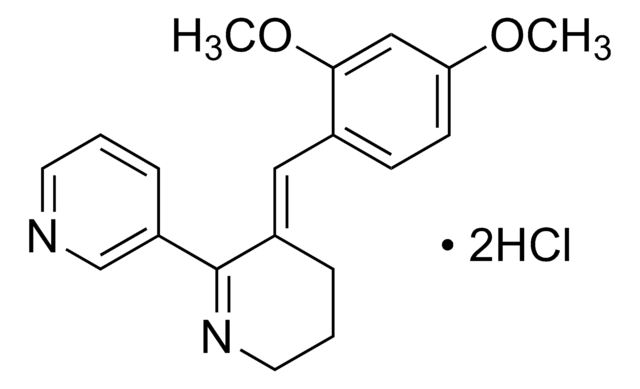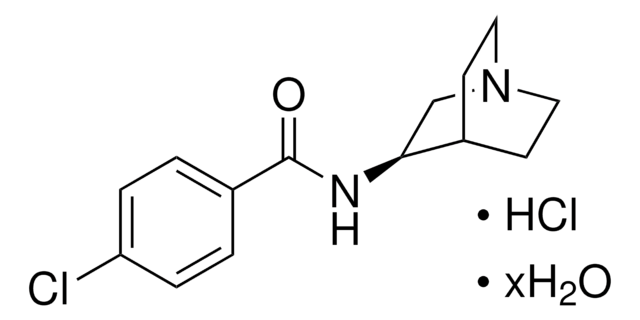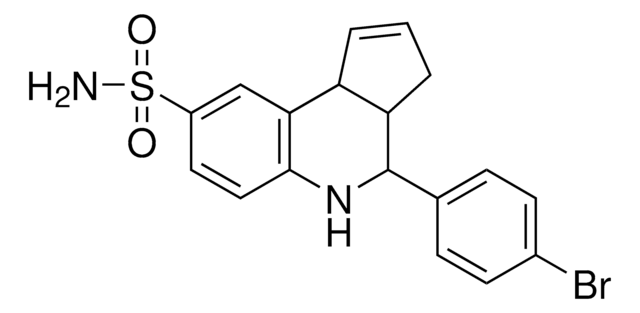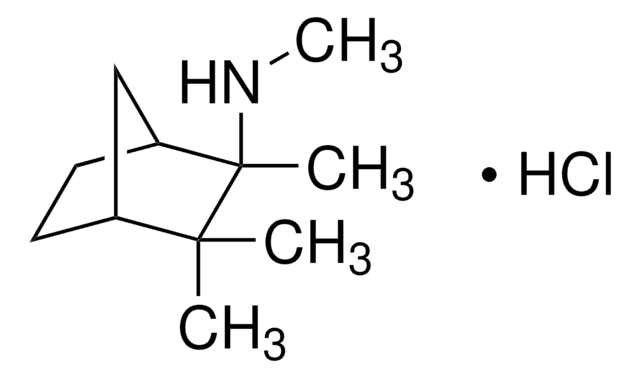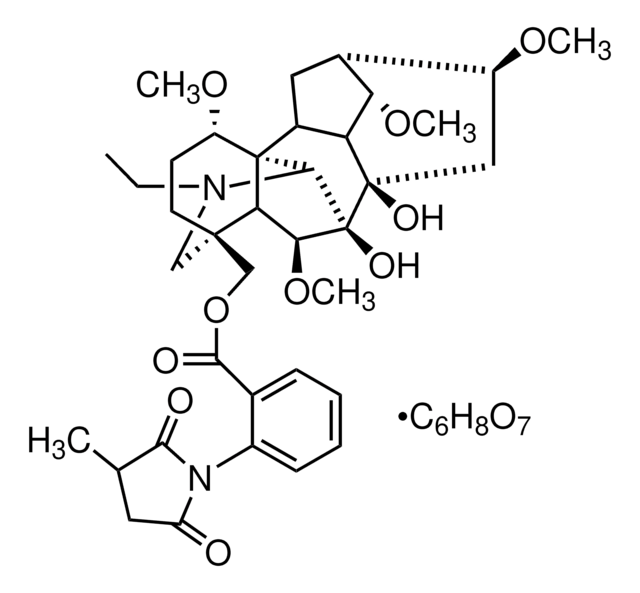おすすめの製品
アッセイ
≥97% (HPLC)
フォーム
powder
色
faintly yellow to dark yellow
溶解性
H2O: >5 mg/mL
保管温度
2-8°C
SMILES記法
Cl.Cl.COc1ccc(\C=C2/CCCN=C2c3cccnc3)c(OC)c1
InChI
1S/C19H20N2O2.2ClH/c1-22-17-8-7-14(18(12-17)23-2)11-15-5-4-10-21-19(15)16-6-3-9-20-13-16;;/h3,6-9,11-13H,4-5,10H2,1-2H3;2*1H/b15-11+;;
InChI Key
BXKYFUGAAFLYJL-BXGYHSFXSA-N
アプリケーション
GTS-21は、次の用途で使用されています。
- マウスマクロファージにおける抗炎症性作用を明らかにするために、α7ニコチン性アセチルコリン受容体(nAChR)部分アゴニストとして。
- リポ多糖(LPS)が誘発する腎傷害に対する保護作用を試験するために。
- 内毒血症においてLPSが誘発する微小血管炎症に対する作用を試験するために。
生物化学的/生理学的作用
GTS-21は、α-7ニコチン受容体の選択的作動薬であり、抗炎症および認識強化活性を示します。GST-21はまた、精神分裂病の治療にも応用されています。
GTS-21は、α-7ニコチン受容体の選択的作動薬です。
anisineの誘導体であるGTS-21は、免疫調節薬です。膵炎および敗血症の治療に使用されます。GTS-21は炎症促進性サイトカインを阻害し、特に敗血症および内毒血症においてインターロイキン6(IL-6)および腫瘍壊死因子(TNF)を阻害します。
特徴および利点
この化合物は、受容体分類およびシグナル変換ハンドブックのアセチルコリン受容体(ニコチン性)ページで特集されています。ハンドブックのその他のページをご覧になるには、ここをクリックしてください。
保管分類コード
11 - Combustible Solids
WGK
WGK 3
引火点(°F)
Not applicable
引火点(℃)
Not applicable
適用法令
試験研究用途を考慮した関連法令を主に挙げております。化学物質以外については、一部の情報のみ提供しています。 製品を安全かつ合法的に使用することは、使用者の義務です。最新情報により修正される場合があります。WEBの反映には時間を要することがあるため、適宜SDSをご参照ください。
Jan Code
SML0326-VAR:
SML0326-25MG:
SML0326-BULK:
SML0326-5MG:
Matthijs Kox et al.
Biochemical pharmacology, 78(7), 863-872 (2009-07-07)
The vagus nerve can limit inflammation via the alpha7 nicotinic acetylcholine receptor (alpha7nAChR). Selective pharmacological stimulation of the alpha7nAChR may have therapeutic potential for the treatment of inflammatory conditions. We determined the anti-inflammatory potential of GTS-21, an alpha7nAChR-selective partial agonist
W R Kem
Behavioural brain research, 113(1-2), 169-181 (2000-08-15)
A large decrease in brain nicotinic receptor levels occurs in Alzheimer's disease, relative to muscarinic and other receptors. Neurons possessing high affinity nicotinic receptors seem particularly vulnerable. The low affinity nicotinic receptors which selectively bind alpha-bungarotoxin are not significantly affected.
Bianca Brawek et al.
International journal of molecular sciences, 22(3) (2021-01-28)
Microglia, the innate immune cells of the brain, are commonly perceived as resident macrophages of the central nervous system (CNS). This definition, however, requires further specification, as under healthy homeostatic conditions, neither morphological nor functional properties of microglia mirror those
Ryan E Hibbs et al.
The EMBO journal, 28(19), 3040-3051 (2009-08-22)
The pentameric acetylcholine-binding protein (AChBP) is a soluble surrogate of the ligand binding domain of nicotinic acetylcholine receptors. Agonists bind within a nest of aromatic side chains contributed by loops C and F on opposing faces of each subunit interface.
Caijuan Shi et al.
Journal of molecular modeling, 19(2), 871-878 (2012-10-23)
Nicotinic acetylcholine receptors (nAChRs) are drug targets for neuronal disorders and diseases. Partial agonists for nAChRs are currently being developed as drugs for the treatment of neurological diseases for their relative safety originated from reduced excessive stimulation. In the current
ライフサイエンス、有機合成、材料科学、クロマトグラフィー、分析など、あらゆる分野の研究に経験のあるメンバーがおります。.
製品に関するお問い合わせはこちら(テクニカルサービス)
